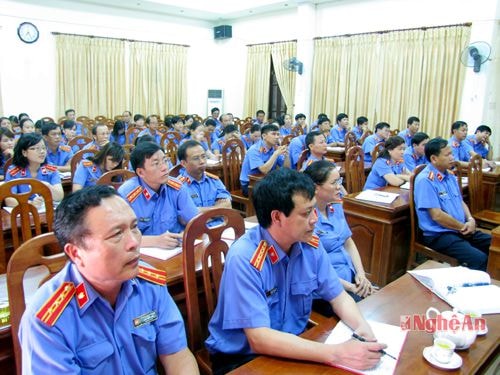Comments on amendments to the 2005 Civil Code
(Baonghean) - The 2005 Civil Code has a particularly important role and position in the current legal system of our country. To contribute to the completion of the Vietnamese legal system and the building of a true rule of law state, I would like to contribute some opinions on the amendment of the 2005 Civil Code as follows:
1.Regarding households: The draft Civil Code (amended) does not officially recognize households as an independent subject of civil legal relations, which will reduce difficulties for notary offices and courts when determining what a household is and which members it includes. Article 237 of the draft recognizes common ownership of households as common ownership by shares, which will create a suitable mechanism for subjects when establishing transactions related to common property of households. However, in addition, not stipulating that households are subjects of civil legal relations will lead to a number of consequences such as: having to review and amend many legal documents with provisions on households; Many current legal relationships performed by households are still recognized and protected by law, as well as many administrative procedures and legal documents related to households. How will they continue to be handled and what is the appropriate roadmap to ensure the rights and obligations of households and their members in transactions that have been performed, while still ensuring the stability of civil transactions?
 |
| The Provincial Procuracy organized to collect comments on the draft Civil Code. |
Therefore, I think that, for households, in the short term, it is necessary to complete the shortcomings of the regulations on households in the 2005 Civil Code and only limit transactions of households related to common property, which is land use rights; in the long term, this should not be recognized as a subject of civil legal relations because of the unstable and unsustainable nature of households as well as the difficulty in developing regulations to regulate internal relations between family members.
2.Provisions on joint wills of husband and wife: Article 663 of the Civil Code stipulates that husband and wife can make a joint will to dispose of common property. This provision aims to create conditions for husband and wife to express their unified will in the disposal of their common property and it has contributed to promoting civil relations as well as the issue of respecting and protecting the civil rights of property owners.
According to Clause 1, Article 664 of the Civil Code, the husband and wife can amend, supplement, replace, or cancel the will at any time. However, Clause 2, Article 664 stipulates that amending, supplementing, replacing, or canceling a joint will must have the consent of the other person; if one person dies first, the other person can only amend or supplement the will related to his or her portion of the property. Thus, in this case, the will of the joint testator cannot be independent in deciding the property, including his or her portion of the joint property of the husband and wife, when the husband or wife does not agree.
On the other hand, Article 668 of the Civil Code stipulates that the joint will of a husband and wife takes effect from the time the last person dies or at the time when both husband and wife die together. In reality, husband and wife often do not die at the same time, but in many cases, there is a gap of decades or even longer. In that case, if the heir has a need to divide the property, he or she will not be able to do so, affecting their legitimate rights and interests. Moreover, the surviving husband or wife will not be able to fully exercise their rights to that joint will.
To ensure the rights of the testator of a joint will between husband and wife, the Civil Code should consider amending Clause 2, Article 664 in the direction of allowing one spouse to amend, supplement, replace, or cancel the will within the scope of his or her portion of the joint property of the husband and wife (as determined by the joint will) at any time, even without the consent of the husband or wife. At that time, if the other spouse does not agree, the previously established joint will is considered invalid, and each person has the right to decide his or her portion according to the general provisions on inheritance. In the event that one spouse dies first, it should be stipulated that the inheritance can be divided among the heirs upon request and with the consent of the surviving husband or wife (amend Article 668- Civil Code on the validity of the joint will of husband and wife).
Bui Thu Thao






